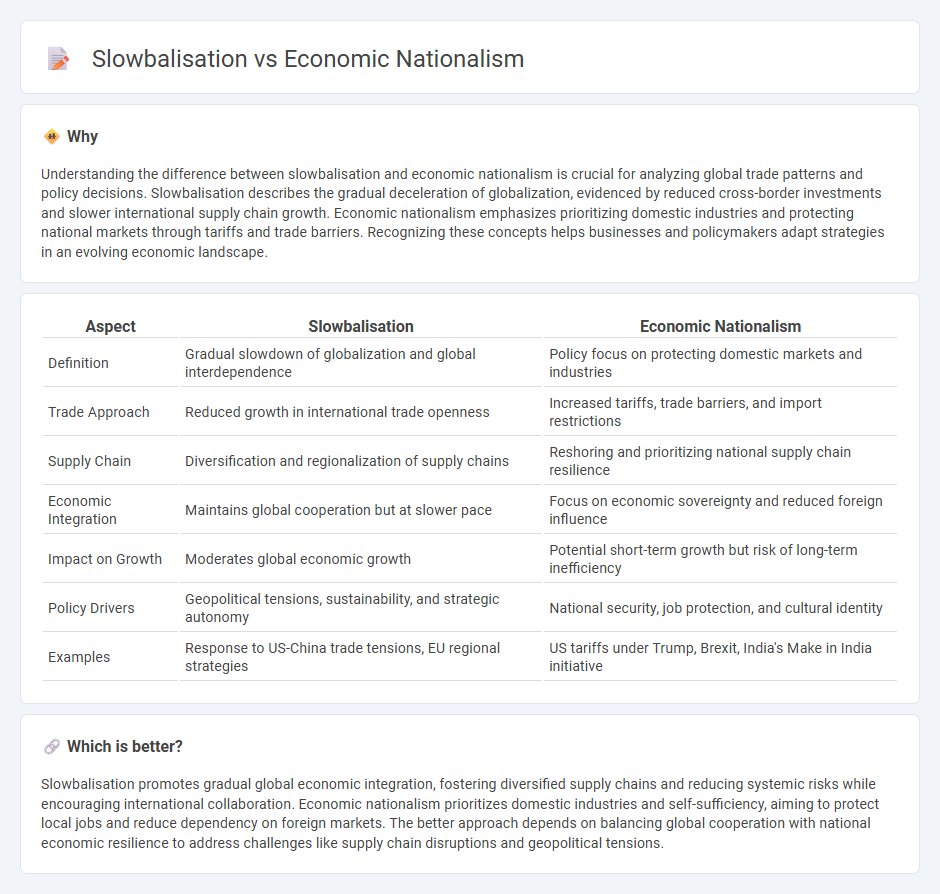
Slowbalisation reflects the gradual deceleration of global economic integration, characterized by reduced cross-border trade and investment flows compared to previous decades. Economic nationalism emphasizes protecting domestic industries through tariffs, subsidies, and regulatory measures to prioritize national economic interests. Explore further to understand how these divergent approaches shape global trade dynamics and policy decisions.
Why it is important
Understanding the difference between slowbalisation and economic nationalism is crucial for analyzing global trade patterns and policy decisions. Slowbalisation describes the gradual deceleration of globalization, evidenced by reduced cross-border investments and slower international supply chain growth. Economic nationalism emphasizes prioritizing domestic industries and protecting national markets through tariffs and trade barriers. Recognizing these concepts helps businesses and policymakers adapt strategies in an evolving economic landscape.
Comparison Table
| Aspect | Slowbalisation | Economic Nationalism |
|---|---|---|
| Definition | Gradual slowdown of globalization and global interdependence | Policy focus on protecting domestic markets and industries |
| Trade Approach | Reduced growth in international trade openness | Increased tariffs, trade barriers, and import restrictions |
| Supply Chain | Diversification and regionalization of supply chains | Reshoring and prioritizing national supply chain resilience |
| Economic Integration | Maintains global cooperation but at slower pace | Focus on economic sovereignty and reduced foreign influence |
| Impact on Growth | Moderates global economic growth | Potential short-term growth but risk of long-term inefficiency |
| Policy Drivers | Geopolitical tensions, sustainability, and strategic autonomy | National security, job protection, and cultural identity |
| Examples | Response to US-China trade tensions, EU regional strategies | US tariffs under Trump, Brexit, India's Make in India initiative |
Which is better?
Slowbalisation promotes gradual global economic integration, fostering diversified supply chains and reducing systemic risks while encouraging international collaboration. Economic nationalism prioritizes domestic industries and self-sufficiency, aiming to protect local jobs and reduce dependency on foreign markets. The better approach depends on balancing global cooperation with national economic resilience to address challenges like supply chain disruptions and geopolitical tensions.
Connection
Slowbalisation reflects a deceleration in global economic integration, driven by rising economic nationalism that prioritizes domestic industries and reduces reliance on international trade. Economic nationalism encourages protectionist policies, tariffs, and reshoring of supply chains, reinforcing slowbalisation trends. Together, these phenomena reshape global markets by emphasizing self-sufficiency over globalization.
Key Terms
Protectionism
Economic nationalism emphasizes protectionism by prioritizing domestic industries through tariffs, import quotas, and subsidies to shield the economy from foreign competition and preserve national sovereignty. Slowbalisation reflects a gradual retreat from globalization, characterized by increased trade barriers and a strategic shift toward self-sufficiency in critical sectors to mitigate global supply chain risks. Explore in-depth how protectionist policies impact global trade dynamics and national economic resilience.
Trade Barriers
Economic nationalism promotes increased trade barriers such as tariffs and quotas to protect domestic industries from foreign competition, leading to reduced reliance on global markets. In contrast, slowbalisation reflects a gradual rise in trade restrictions and reshoring efforts without fully reverting to protectionism, resulting in a slower rate of global trade integration. Explore this evolving dynamic to understand its impact on global economic strategies and supply chains.
Global Supply Chains
Economic nationalism emphasizes reshoring and diversification to reduce dependency on global supply chains, aiming for greater control and security in critical industries. Contrastingly, slowbalisation represents a gradual deceleration of globalization, with companies optimizing regional and resilient supply networks rather than pursuing expansive global sourcing. Explore in-depth insights on how these dynamics reshape global trade and supply chain strategies.
Source and External Links
Economic nationalism - Wikipedia - Economic nationalism is an ideology prioritizing state intervention in the economy to serve nationalist goals, favoring protectionism, domestic control, and opposing globalization and free trade.
Chapter 1: Economic nationalism in historical perspective - Economic nationalism originated in the 19th century to protect weaker, late-industrializing nations, and re-emerged in the 21st century amid US-China rivalry with renewed protectionism and tariffs.
The Revival of Economic Nationalism and the Global Trading System - Economic nationalism views trade as a zero-sum game where one nation's gain is another's loss, contrasting with the multilateral trade system's positive-sum approach, and has influenced recent US trade policy under Trump.
 dowidth.com
dowidth.com